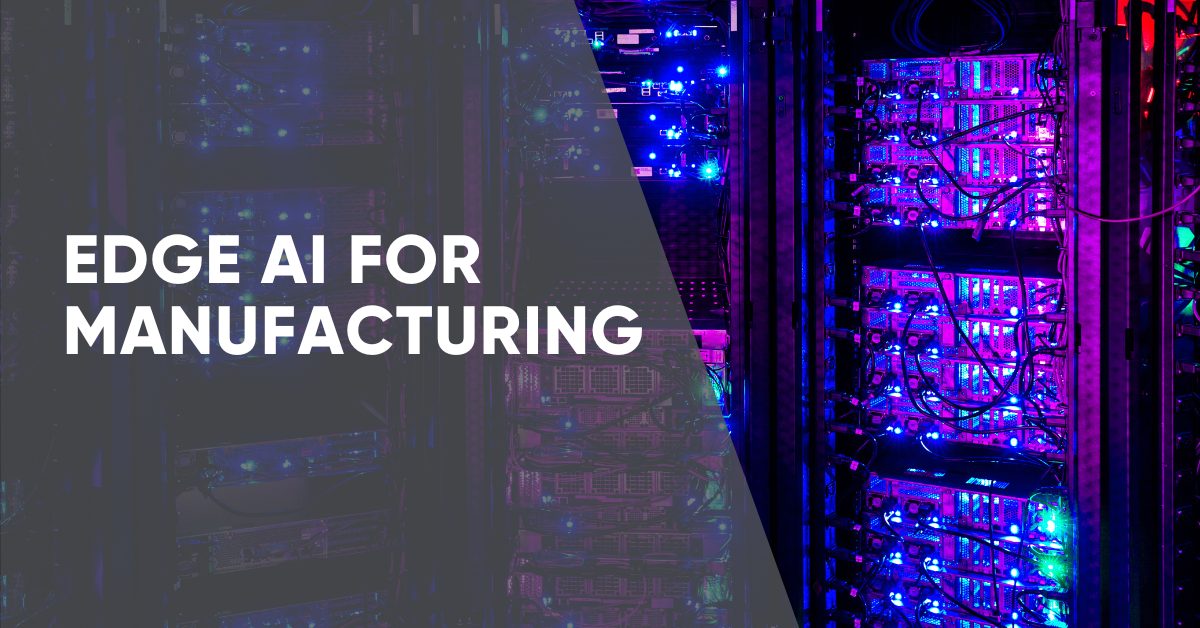In the rapidly evolving landscape of manufacturing, technology continues to play a crucial role in optimizing efficiency, productivity, and overall operational performance. One such technological advancement that has gained significant attention in recent years is edge-based AI solutions. These cutting-edge systems are transforming manufacturing facilities by bringing artificial intelligence (AI) capabilities closer to the production line, offering real-time insights and empowering decision-making at the edge.
What is “The Edge”?
So, what exactly is an edge-based AI solution? Simply put, it is the deployment of AI algorithms and computational power directly within a manufacturing facility. Unlike traditional cloud-based AI solutions that require data to be sent to the cloud for processing, edge-based AI solutions process data locally, enabling faster response times and reducing reliance on network connectivity.
Manufacturing facilities are often dynamic environments with complex operations and time-sensitive processes. By leveraging edge-based AI solutions, organizations can enhance their operational efficiency and gain a competitive edge. These solutions enable real-time monitoring and analysis of data collected from various sensors and devices, allowing for predictive maintenance, quality control, and performance optimization.
Benefits of Edge Computing
One of the key benefits of edge-based AI solutions in manufacturing facilities is reduced latency. By processing data locally, these systems can provide instant feedback and take immediate action. This is particularly crucial in scenarios where even a fraction of a second can make a significant difference, such as preventing equipment failures, optimizing production cycles, and high-speed quality control.
Edge-based AI solutions also address concerns related to data privacy and security. Since data processing takes place locally, sensitive information can be kept within the facility, minimizing the risk of unauthorized access or data breaches. This level of control and security is of paramount importance in industries where intellectual property and trade secrets are at stake.
Edge AI also saves money for organizations looking to reduce the costs associated with data processing and management. As cloud computing costs are on the rise, local data processing is a predictable, manageable expense.
Is Edge-based AI only used in Manufacturing?
No! Edge-based AI has found applications across various industries, transforming operations, and enabling real-time decision-making.
Manufacturing: Edge computing AI is widely employed in manufacturing facilities to optimize production processes, monitor equipment health, ensure quality control, and enable predictive maintenance. By processing data at the edge, manufacturers can reduce latency, increase efficiency, and minimize downtime.
Healthcare: In the healthcare industry, edge computing AI facilitates remote patient monitoring, real-time data analysis, and timely intervention. Edge devices, such as wearable health trackers, enable continuous monitoring of vital signs and alert healthcare professionals in case of abnormalities. This technology also supports the rapid analysis of medical images and enables real-time response in critical situations.
Transportation and Logistics: Edge computing AI is instrumental in the transportation and logistics sector, where real-time data processing is crucial for efficient operations. It enables intelligent fleet management, route optimization, demand forecasting, and enhances supply chain visibility. Edge devices installed in vehicles, warehouses, and distribution centers enable efficient data analysis and decision-making.
Retail: Retailers leverage edge computing AI to enhance customer experiences and optimize store operations. Edge devices capture and analyze data on customer behavior, inventory levels, and store performance. This information is then used to personalize shopping experiences, optimize inventory management, and streamline supply chains.
Energy and Utilities: Edge computing AI is applied in the energy and utilities sector for grid optimization, predictive maintenance of infrastructure, and demand response management. Edge devices installed in smart meters, transformers, and power distribution equipment enable real-time analysis, fault detection, and load balancing.
Smart Cities: Edge computing AI plays a vital role in building smart cities by enabling real-time monitoring and analysis of data from various sensors and devices. It supports traffic management, environmental monitoring, waste management, public safety, and infrastructure optimization.
Agriculture: Edge computing AI helps farmers in precision agriculture by monitoring soil conditions, crop health, and optimizing irrigation and fertilization. Edge devices combined with AI algorithms provide farmers with actionable insights, enabling them to make data-driven decisions and optimize yields.
Edge-based AI solutions are revolutionizing multiple industries, including manufacturing by bringing AI capabilities directly out of the cloud to exactly where they are needed. These solutions enable real-time data processing, reduced latency, and enhanced security, ultimately leading to improved operational efficiency and decision-making. As the world continues to embrace digital transformation, edge-based AI solutions will undoubtedly play a pivotal role in shaping the future.

